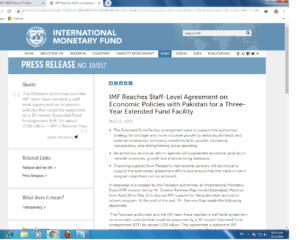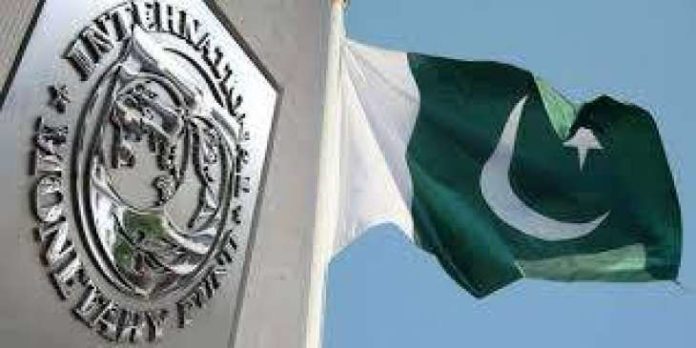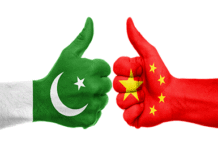By Muhammad Luqman
The technical teams of government and the International Monetary Fund (IMF) have reached an agreement on a bailout package for Pakistan, Adviser to Prime Minister on Finance, Revenue and Economic Affairs Dr Abdul Hafeez Shaikh announced.
“After months of discussions and negotiations, a staff-level agreement has been reached between Pakistan and the IMF,” he told state-run PTV News.
Dr Shaikh said that Pakistan would receive $6 billion worth of assistance under the IMF programme over a period of three years.
He said the staff-level agreement, which still needs to be approved by the IMF board of directors in Washington, would show that effective reforms were underway in Pakistan.
Dr Shaikh said IMF is an international institution whose primary job is to assist member countries who are in an “economic difficulty”. He said the government could not have bridged the financing gap of $12 billion on its own that he said was created by a weak economy.
Besides the IMF assistance, Pakistan will also receive additional funds worth nearly $2-3 billion from institutions like the World Bank and Asian Development Bank, the adviser revealed.
 According to an IMF statement issued on Sunday evening, the facility aims to support Pakistani authorities’ “strategy for stronger and more inclusive growth by reducing domestic and external imbalances, removing impediments to growth, increasing transparency, and strengthening social spending.
According to an IMF statement issued on Sunday evening, the facility aims to support Pakistani authorities’ “strategy for stronger and more inclusive growth by reducing domestic and external imbalances, removing impediments to growth, increasing transparency, and strengthening social spending.
It said financing support from Pakistan’s international partners will be “critical to support the authorities’ adjustment efforts and ensure that the medium-term programme objectives can be achieved”, head of the IMF mission Ramirez Rigo said.
“Pakistan is facing a challenging economic environment, with lacklustre growth, elevated inflation, high indebtedness, and a weak external position. […] The authorities recognise the need to address these challenges, as well as to tackle the large informality in the economy, the low spending in human capital, and poverty. In this regard, the government has already initiated a difficult, but necessary, adjustment to stabilise the economy, including thorough support from the State Bank of Pakistan. These efforts need to be strengthened,” he explained.
“Decisive policies and reforms, together with significant external financing are necessary to reduce vulnerabilities faster, increase confidence, and put the economy back on a sustainable growth path, with stronger private sector activity and job creation,” Ramirez Rigo added.
The IMF mission chief emphasised , in addition to the EFF, “a comprehensive plan for cost-recovery in the energy sectors and state-owned enterprises will help eliminate or reduce the quasi-fiscal deficit that drains scarce government resources”.
Rigo said the forthcoming budget for FY2019-20 is “a first critical step” in the fiscal strategy of the PTI government. “The budget will aim for a primary deficit of 0.6 per cent of GDP supported by tax policy revenue mobilisation measures to eliminate exemptions, curtail special treatments, and improve tax administration,” he added.
Noting that inflation in Pakistan “disproportionately affects the poor”, the IMF official said the State Bank of Pakistan will focus on reducing inflation and safeguarding financial stability.
“A market-determined exchange rate will help the functioning of the financial sector and contribute to a better resource allocation in the economy,” he said.















